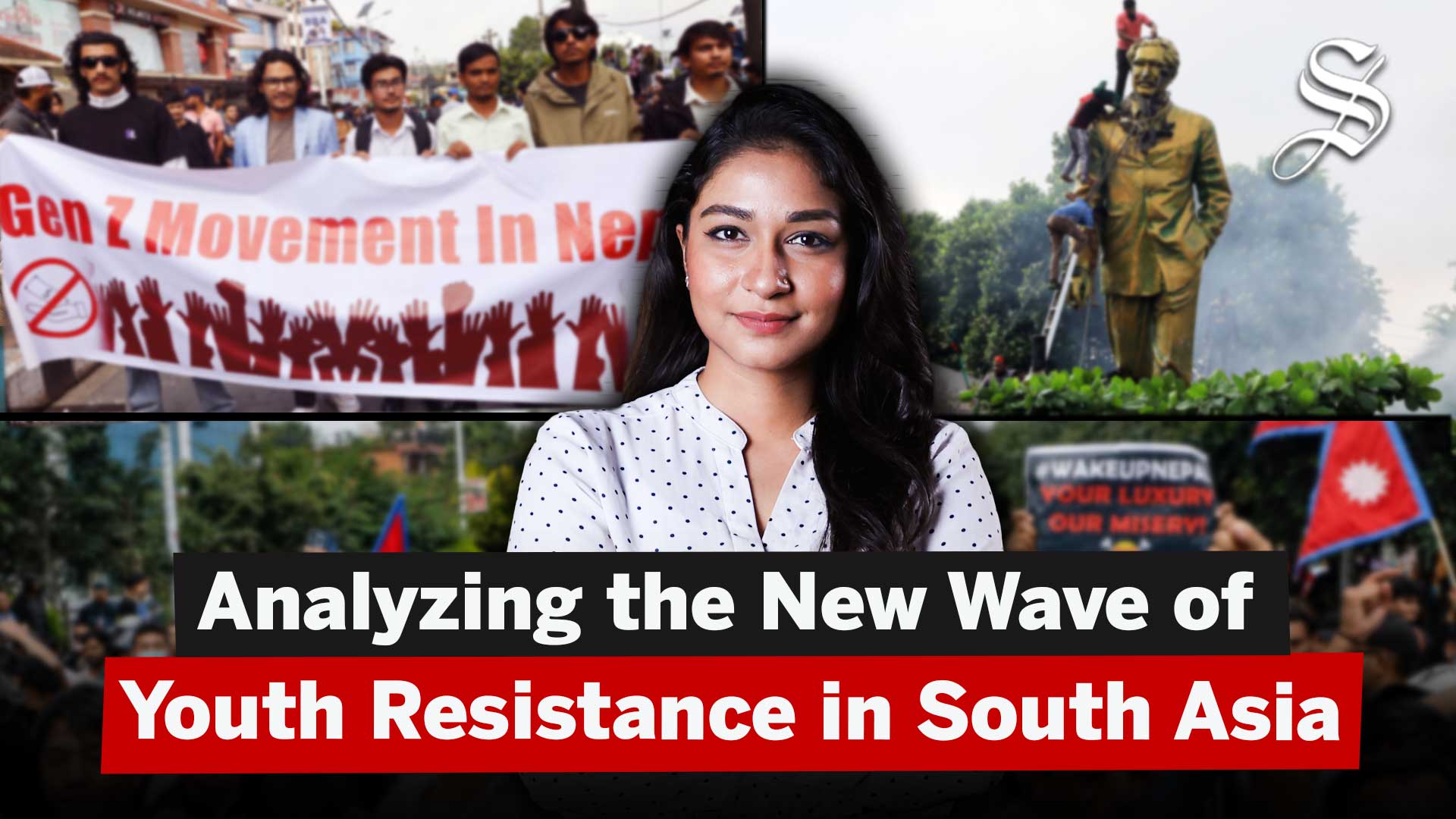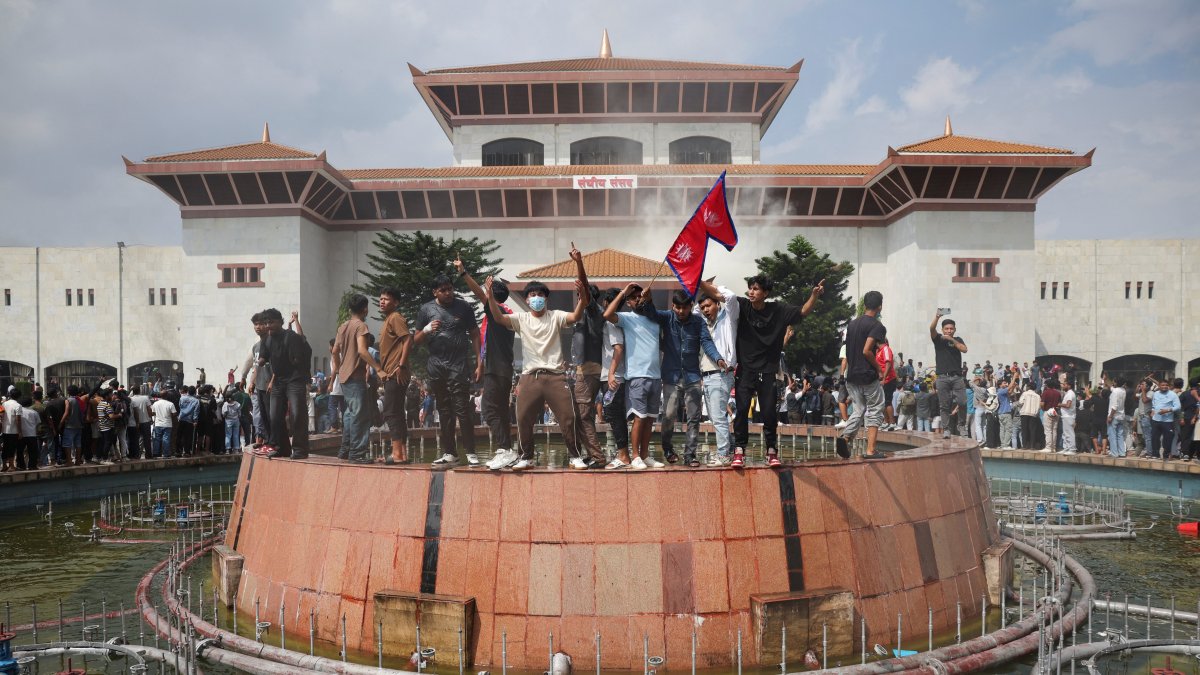An Orwellian look at modern Asian upheavals

On a night lit by the glow of telescreens, George Orwell imagined Winston Smith scribbling in his diary: Big Brother is watching you. That phrase, once dismissed as fiction, now rings uncomfortably close to our daily lives. Smartphones track us, CCTV cameras watch silently, and social media platforms record more than we willingly share. The unsettling part? These are not the tools of a future dictatorship—they are today's habits, normalised in the name of convenience and security. The question lingers: was Orwell simply writing a novel, or was he sketching the manual of a society we are now stumbling into?
Published in 1949, the novel 1984 was built from Orwell's bruises: his time in the Spanish Civil War, his observation of Stalin's Soviet Union, and the shadow of World War II. Surveillance, distortion of language, and the rewriting of history were not abstract ideas for him; they were lived experiences. What makes the book remarkable is not just its dystopian landscape but how it exposes the fragility of truth when power demands obedience. In Oceania, as in many corners of today's world, history is not remembered but edited. Language is not free but restricted, cut into pieces until even imagination becomes unthinkable.
Orwell's warnings feel sharper in South and Southeast Asia, where democracy often lives on borrowed time. Bangladesh and Nepal's youth-led uprisings, Sri Lanka's collapse under economic mismanagement, and Indonesia's crackdowns on free speech all echo the patterns 1984 mapped out decades ago. If Oceania controlled minds through fear and language, these societies show how modern states still bend information, economics, and even history to tighten their grip.
Take Bangladesh and Nepal. In Bangladesh, what began as a simple protest to dismantle the quota system in public job recruitment turned into a nationwide movement in July-August 2024. In Nepal, the protests of 2025 were not merely angry gatherings; they were a reminder that a digitally-charged generation refuses silence. In both countries, young demonstrators toppled a prime minister. Their strength didn't come from grand political parties but from collective frustration: lack of jobs, endless corruption, and governments trying to muzzle online speech. When authorities attempted to shut down social platforms, it backfired spectacularly. Gen Z organised faster, angrier, and more determined. It is Orwell's logic in motion: the more you tighten control, the more truth slips through cracks.
Sri Lanka tells a different story. The 2022 economic meltdown stripped the island bare: fuel queues snaked across streets, food prices ballooned, and medicines vanished from shelves. Public patience collapsed with the currency. What followed was not a carefully plotted revolution but raw human desperation that ended with the president fleeing his palace. International lenders arrived with bailouts, yet the lesson is brutally simple. When governments hoard power but fail to secure the basic needs of their citizens, no amount of propaganda can protect them. Orwell wrote of regimes that manipulate hunger to tame populations; Sri Lanka's tragedy proves hunger can also topple the powerful.
Indonesia, often praised as one of Asia's strongest democracies, carries its own contradictions. Reports of human rights abuses in Papua, intimidation of journalists, and a creeping culture of self-censorship raise the question: how democratic is a democracy where criticism comes with risk? Here, Orwell's "thought police" may not appear in trench coats, but the effect is similar. Once media voices hesitate, once journalists start editing themselves out of fear, the state doesn't even need to censor directly—it has already won.
These examples may seem distant from the London of Orwell's imagination, yet the underlying thread is the same: control information, and you control people. In 1984, "Newspeak" reduced language so thoroughly that rebellion became linguistically impossible. In today's South-Southeast Asian region, it is not new words but the flooding of misinformation, algorithm-driven outrage, and deliberate silencing of independent journalism that limit the public's ability to think freely. Orwell warned us that whoever defines words defines reality. Social media platforms, governments, and even corporations now compete for that power.
Still, it would be a mistake to treat 1984 as a prophecy fulfilled in one neat stroke. Every society is messier than fiction allows. Bangladesh and Nepal's youth use the same social media tools for both mobilisation and spreading rumours. Sri Lanka's crisis was rooted in economics as much as politics. Indonesia's democratic backsliding is complicated by regional conflicts and a history of military dominance. Orwell's novel doesn't predict these specifics; it equips us with a language to critique them. The challenge lies in not forcing lazy comparisons but recognising patterns of control that echo across time.
What makes the novel last is not just its politics but its humanity. Readers remember Winston not because he is heroic—he fails—but because he is recognisably ordinary. His brief affair, his scribbled thoughts, his fragile hope—these small details remind us that political oppression is never abstract. It crushes people's most private moments. In South and Southeast Asia today, behind the grand talk of "economic reform" or "digital regulation," it is always the ordinary people who pay the price: the student unable to find work, the family skipping meals, the journalist too afraid to print what he knows. The human cost is what gives Orwell's warnings their weight.
What, then, is the way forward? The easy answer, "strengthen democracy," is too vague. The harder truth is that democracy demands specific, unglamorous safeguards: independent courts, free press, credible civil society organisations, and education systems that encourage critical thinking. Without any of them, societies slip into the cycles Orwell dissected so clearly.
The media deserves special mention. Once reduced to government mouthpieces or algorithm-driven echo chambers, the press loses its power to hold authority accountable. The new battleground is not only newsrooms but also classrooms. Teaching students how to read critically, to question sources, and to understand how digital platforms manipulate attention may be the only antidote to modern "Newspeak." If Orwell argued that words could be cut to cut thought, then expanding media literacy is our best chance to resist.
The lesson of 1984 is uncomfortable: repression does not begin with violence but with indifference. When citizens shrug at surveillance, when misinformation becomes entertainment, when hunger is tolerated as "temporary hardship," the groundwork is already laid. Asia's recent turmoil—whether in Dhaka, Kathmandu, Colombo or Jakarta—shows what happens when that groundwork hardens into reality. Fiction does not predict the future, but it can warn us. Orwell's warning has been sounding for more than 70 years. The real question is whether we are willing to listen.
Syed Raiyan Amir is senior research associate at The KRF Center for Bangladesh and Global Affairs (CBGA). He can be reached at raiyancbga@gmail.com.
Views expressed in this article are the author's own.
Follow The Daily Star Opinion on Facebook for the latest opinions, commentaries and analyses by experts and professionals. To contribute your article or letter to The Daily Star Opinion, see our guidelines for submission.




 For all latest news, follow The Daily Star's Google News channel.
For all latest news, follow The Daily Star's Google News channel. 


Comments